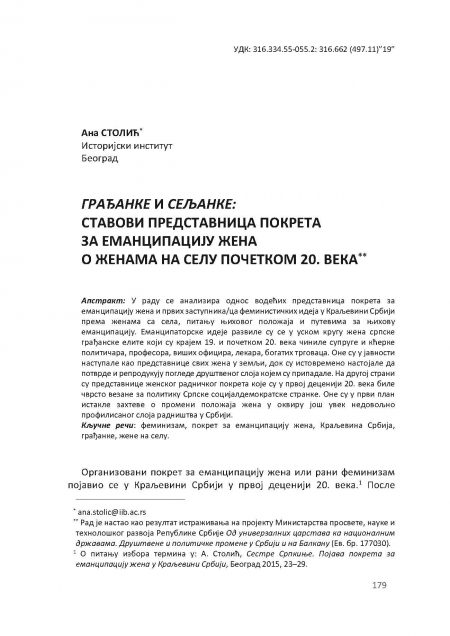
Abstract
Organised voluntary humanitarian work of women in Serbia began in the 1870s. Longlasting associations were established at the time – the Jewish Female Society and the Belgrade Female Society. In the course of decades, the Belgrade Female Society and its subsidiaries in the interior developed numerous activities, taking part in the country’s social policy. Although these activities implied reproducing of the gender role of a woman, participation in them had a great influence on the creation of feminist consciousness among a number of women, members of the higher social stratum. In the early 20th century, at the time of intensive patriotic mobilisation of women, associations were established to provide help to compatriots outside the country (the Kneginja Ljubica Society from 1899 and Kolo srpskih sestara from 1903). The first organisation which gathered the majority of women’s associations at the national level and which put forward feminist objectives was the Serbian National Female Union (from 1906/1911). While older associations did not deal with villages, where around 90% of Serbia’s population lived, the Serbian National Female Union included in the work programme of its Cultural Unit (in addition to the Humane and Feminist Units) the launching of literacy courses for women peasants and the establishment of schools for housewives in the village. However, in the polemics held during the defining of these tasks, at public lectures and in published texts, it transpired that the leading members of the Union, who belonged to the higher social stratum in the country, observed women in villages as a separate world, the world of ignorance, prejudices and penury, which could be rooted out with a missionary intervention “from above”. Just as they replicated the perception of their social stratum, they demonstrated a fundamental lack of interest in the real causes of the bad situation in villages. In defining the requests for amending provisions of inheritance law, whereby female children would have equal rights to property inheritance, they intended to leave out women from villages, for the sake of the higher interest of preserving village estates from division. Their efforts on the practical plane, which implied launching literacy courses and setting up schools for housewives, did not produce visible results due to the lack of human and material resources, the lack of interest of the government, without which these objectives could not be implemented, and finally, due to the beginning of the new epoch of wars in 1912 – the Balkan Wars and the First World War.
Information
| Published in | Beograd |
| Year of publication | 2017 |
| Author | Ana Stolić |
| Publisher | Istorijski institut Beograd i Muzej na otvorenom Sirogojno |
| Publication | Selo Balkana. Kontinuiteti i promene kroz istoriju |
| Pages | 179 - 190 |
| Keywords |
|
How to cite this publication:
Istorijski Institut, portal Žene kroz istoriju. "GRAĐANKE I SELJANKE: STAVOVI PREDSTAVNICA POKRETA ZA EMANCIPACIJU ŽENA O ŽENAMA NA SELU POČETKOM 20. VEKA (en translation)". Access date: 20. April 2024. URL: https://zristorija.iib.ac.rs/en/istrazivanja/gradjanke-i-seljanke-stavovi-predstavnica-pokreta-za-emancipaciju-zena-o-zenama-na-selu-pocetkom-20-veka-en-translation/